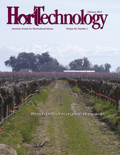
HORTTECHNOLOGY
Scope & Guideline
Cultivating excellence in horticultural research and education.
Introduction
Aims and Scopes
- Horticultural Crop Production:
Research related to the cultivation, management, and improvement of various horticultural crops, including fruits, vegetables, and ornamental plants. - Sustainable Practices:
Emphasis on sustainable agricultural practices, including organic farming, integrated pest management, and the use of biodegradable materials to reduce environmental impact. - Soil and Water Management:
Studies focusing on soil health, irrigation strategies, and water conservation techniques that enhance crop productivity while minimizing resource use. - Plant Physiology and Biochemistry:
Investigations into the physiological and biochemical processes of plants to improve growth, yield, and quality through various treatments and environmental conditions. - Consumer and Market Research:
Analysis of consumer preferences, market trends, and economic viability in horticulture, including the retail floral industry and local produce markets. - Innovative Technologies in Horticulture:
Application of advanced technologies such as controlled environments, precision agriculture, and automation in horticultural practices.
Trending and Emerging
- Climate Resilience and Adaptation:
Increasing emphasis on developing horticultural practices and crop varieties that are resilient to climate change, including drought and extreme temperatures. - Consumer Engagement and Sustainability:
Growing research on consumer attitudes towards sustainability in horticulture, including willingness to pay for environmentally friendly practices and products. - Urban Agriculture and Community Gardening:
Rising interest in urban horticulture, including community gardens and local food systems, reflecting a shift towards food security and local engagement. - Integrated Pest Management (IPM):
Enhanced focus on IPM strategies that combine biological, cultural, and chemical methods to manage pests sustainably and effectively. - Technological Innovations in Horticulture:
Emerging research on the application of smart technologies, such as IoT devices and automation, in enhancing horticultural production and efficiency. - Health and Well-being Benefits of Gardening:
Increased attention to the psychological and physical health benefits of gardening and horticultural therapy, particularly post-pandemic.
Declining or Waning
- Traditional Pest Control Methods:
There is a noticeable decline in research dedicated to conventional chemical pest control, likely due to increased interest in organic and sustainable practices. - Static Horticultural Education Models:
The decrease in research on traditional horticultural education methods suggests a shift towards more dynamic, experiential, and technology-enhanced learning approaches. - Non-sustainable Crop Varieties:
Research on conventional crop varieties that do not emphasize sustainability or resilience is diminishing as more focus is placed on developing resilient, climate-ready cultivars. - Generalized Landscape Aesthetics:
The waning interest in broad landscape aesthetic studies indicates a transition towards more specific research focused on functional and ecological landscape design. - Single-Factor Studies:
Research focusing on isolated factors in horticulture is declining in favor of integrated studies that consider multiple variables and their interactions.
Similar Journals
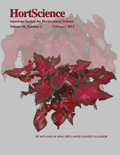
HORTSCIENCE
Exploring the forefront of horticultural research.HORTSCIENCE is a prestigious journal published by the American Society for Horticultural Science, focusing on the latest research and developments in the field of horticulture. With an ISSN of 0018-5345 and an E-ISSN of 2327-9834, this journal has established itself as a vital resource for horticultural scientists, practitioners, and educators since its inception. As of 2020, it has embraced an Open Access model, promoting the dissemination of scientific knowledge and enabling wider accessibility to its rich content. HORTSCIENCE currently holds a Q2 ranking in the Horticulture category for 2023, placing it in the top tier of its field with a Scopus rank of 36 out of 115 in the area of Agricultural and Biological Sciences. This journal publishes empirical research, significant advancements, and comprehensive reviews that contribute to the understanding and improvement of horticultural practices, making it an essential publication for anyone involved in horticultural research or education.

Revista Fitotecnia Mexicana
Connecting Researchers to Transform Plant Genetic ResourcesRevista Fitotecnia Mexicana is a prominent academic journal published by the SOC MEXICANA FITOGENETICA, dedicated to advancing knowledge in the fields of agronomy, crop science, genetics, horticulture, and plant science. With its establishment dating back to 2007 and currently running through 2024, this journal serves as an important platform for researchers, professionals, and academic institutions interested in plant genetic resources and agricultural innovations. Although it holds a Q4 quartile ranking in various categories and is positioned within the lower percentiles in Scopus rankings, it provides crucial insights and opportunities for emerging ideas and local research initiatives. Based in Mexico, and with its indexed ISSN 0187-7380, the journal plays an important role in stemming from the rich agricultural heritage of the region. The lack of open access options underscores the depth of curated content provided, making it a valuable resource for professionals seeking to expand their expertise in the sector.

AgriEngineering
Pioneering Sustainable Solutions in Agronomy and EngineeringAgriEngineering is a premier Open Access journal, published by MDPI, focusing on innovative research across the disciplines of agronomy, horticulture, food science, and engineering. Established in 2019 and headquartered in Basel, Switzerland, this journal has rapidly gained recognition, evidenced by its robust performance in the Scopus rankings and its positioning in Q1 and Q2 quartiles of key categories, including Horticulture and Agronomy. With a commitment to disseminating high-quality research that advances agricultural engineering practices, AgriEngineering provides a platform for researchers, professionals, and students to explore cutting-edge developments aimed at enhancing food production systems and sustainability. Its Open Access model ensures wide-reaching accessibility to vital research outcomes, empowering global collaboration and innovation in the field. For more information on submission and access, you can visit the AgriEngineering website.

Journal of Horticultural Sciences
Connecting Researchers to Transform Horticulture.The Journal of Horticultural Sciences, published by the Society for Promotion of Horticulture (SPH) in India, serves as a vital platform for the dissemination of research in horticulture and related fields. With an ISSN of 0973-354X and an E-ISSN of 2582-4899, this open-access journal has been committed to advancing horticultural knowledge since 2006, allowing researchers to share their findings widely and facilitate significant advancements in the discipline. The journal's influence is reflected in its current category quartile rankings, designated as Q4 in Ecology, Evolution, Behavior and Systematics, Horticulture, and Plant Science for 2023, illustrating its developing reputation within the academic community. It is important to note the journal's Scopus ranking in the field, where it ranks #111 in Horticulture and #709 in Ecology, marking it as a niche publication with potential for growth. As it converges years from 2019 to 2024, this journal aims to further engage scholars, professionals, and students by focusing on innovative research and breakthroughs in horticultural sciences, thus contributing to the global discourse in sustainable agriculture and environmental stewardship.
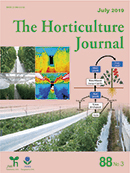
Horticulture Journal
Cultivating Knowledge, Growing FuturesThe Horticulture Journal, published by the Japan Society for Horticultural Science, is a leading academic platform dedicated to the advancement of horticultural research and practices. With an ISSN of 2189-0102 and an E-ISSN of 2189-0110, this journal endeavors to publish high-quality research that emphasizes innovative techniques, sustainable practices, and the science of plant cultivation. The journal has been recognized for its impact within the field, currently holding a Q2 ranking in Horticulture and a Q3 ranking in Plant Science as of 2023, indicating its significant contribution to advancing knowledge. With its open-access model, researchers, professionals, and students have the opportunity to engage with the latest findings, thanks to the journal's commitment to widespread dissemination of information. Since its convergence period began in 2015 and continuing through to 2024, the Horticulture Journal remains instrumental in promoting sustainable and beneficial practices in horticulture science globally.
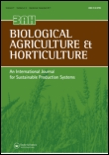
BIOLOGICAL AGRICULTURE & HORTICULTURE
Harvesting breakthroughs in biological agriculture and horticulture.Biological Agriculture & Horticulture, published by Taylor & Francis Ltd, stands as a pivotal journal in the realms of agronomy and horticultural sciences. With an ISSN of 0144-8765 and an E-ISSN of 2165-0616, this esteemed journal has been disseminating vital research since its inception in 1982 and continues to publish leading studies through 2024. It currently boasts a commendable Q2 quartile ranking in both Agronomy and Crop Science as well as Horticulture, placing it in a prominent position within the academic community. With Scopus rankings indicating a 70th percentile in Horticulture and a 62nd percentile in Agronomy and Crop Science, the journal is a key resource for researchers, professionals, and students focused on innovative practices and scientific advancements in biological agriculture. While the journal is not open access, it remains an invaluable repository for cutting-edge research, methodologies, and reviews that push the boundaries of agricultural and horticultural sciences.
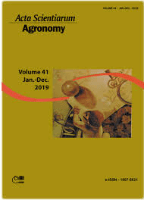
ACTA SCIENTIARUM-AGRONOMY
Connecting researchers to the pulse of agricultural innovation.ACTA SCIENTIARUM-AGRONOMY is a prestigious, peer-reviewed journal published by UNIV ESTADUAL MARINGA, PRO-REITORIA PESQUISA POS-GRADUACAO, focusing on advanced research in the field of agronomy and crop science. Since its inception as an Open Access journal in 2007, it has significantly contributed to disseminating high-quality research, allowing unrestricted access to its content for a global audience. Operating from Brazil, the journal holds a notable Q2 category ranking in Agronomy and Crop Science as of 2023, validating its importance within the academic community. The journal’s Scopus ranking positions it in the 49th percentile among Agricultural and Biological Sciences, indicating a robust foundation for impactful research. With a commitment to innovation and scientific excellence, ACTA SCIENTIARUM-AGRONOMY aims to provide researchers, professionals, and students with vital insights that drive forward our understanding of agriculture and its environmental implications.
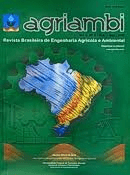
Revista Brasileira de Engenharia Agricola e Ambiental
Fostering Excellence in Agricultural and Environmental ResearchRevista Brasileira de Engenharia Agricola e Ambiental, published by the Universidade Federal de Campina Grande, serves as a pivotal platform for researchers and professionals in the fields of agricultural and biological sciences, agronomy, and environmental engineering. With an open-access policy since 2000, this journal aims to foster global dissemination of innovative research and practices, ensuring that high-quality findings are accessible to all. Operating in Brazil, it holds notable rankings, including Q2 in the categories of Agricultural and Biological Sciences (miscellaneous) and Agronomy and Crop Science, indicating its strong academic impact and influence within these fields. As of 2023, it ranks #68 out of 193 in Agricultural and Biological Sciences and #188 out of 406 in Agronomy and Crop Science, representing its commitment to advancing scientific knowledge. The journal primarily focuses on publishing studies that address challenges in agricultural engineering and environmental sustainability, making it an essential read for students, researchers, and professionals who are dedicated to innovation and excellence in these dynamic fields.
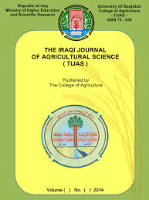
Iraqi Journal of Agricultural Sciences
Connecting research and practice in agricultural sciences.The Iraqi Journal of Agricultural Sciences, published by the College of Agricultural Engineering Sciences, University of Baghdad, is a prominent open-access journal that has been disseminating valuable research in the fields of agricultural and biological sciences since 2005. With an ISSN of 0075-0530 and an E-ISSN of 2410-0862, this journal serves as an essential platform for scholars to share their findings and advancements in various disciplines, including animal science, horticulture, and food science. Recognized for its excellence, the journal achieved Q1 ranking in multiple categories, reflecting its significant contribution to the scientific community and its impact within Scopus rankings. It is particularly dedicated to fostering research that addresses local and global agricultural challenges and promotes sustainable practices in Iraq and beyond. As a pivotal resource for researchers, professionals, and students alike, the Iraqi Journal of Agricultural Sciences invites submissions that advance our understanding of agricultural sciences while supporting the open dissemination of knowledge in this vital sector.

Horticulturae, an esteemed open-access journal published by MDPI, is at the forefront of horticultural science, showcasing innovative research and advancements in the field since its inception in 2015. With its base in Switzerland, this journal operates under the ethos of global accessibility, allowing researchers, professionals, and students to share and disseminate critical findings without barriers. Horticulturae holds a distinguished Q1 ranking in Horticulture and Q2 in Plant Science, as reported in the 2023 categorizations, highlighting its impactful contributions to the scientific community. The journal features rigorous peer-reviewed articles covering a wide range of topics, including plant physiology, crop production, and sustainable practices, making it a vital resource for anyone engaged in gardening, agronomy, and environmental science. As it converges its focus from 2015 to 2024, Horticulturae not only aims to further academic discourse but also aligns with the growing need for research pertaining to biodiversity and sustainable agriculture, thus ensuring relevance in an ever-evolving field.